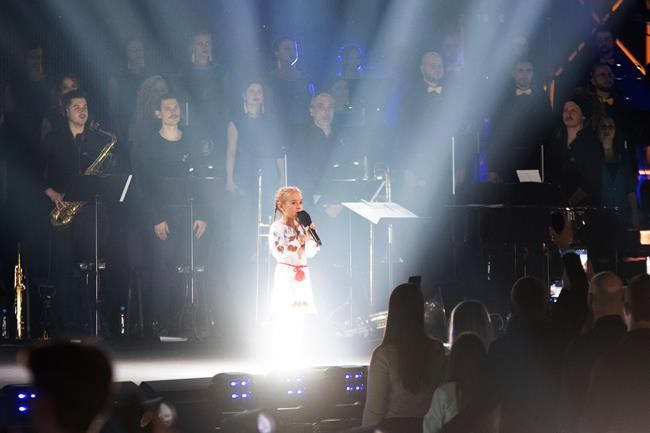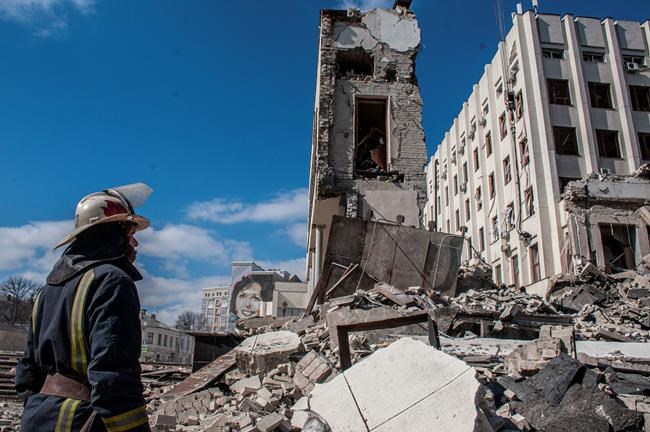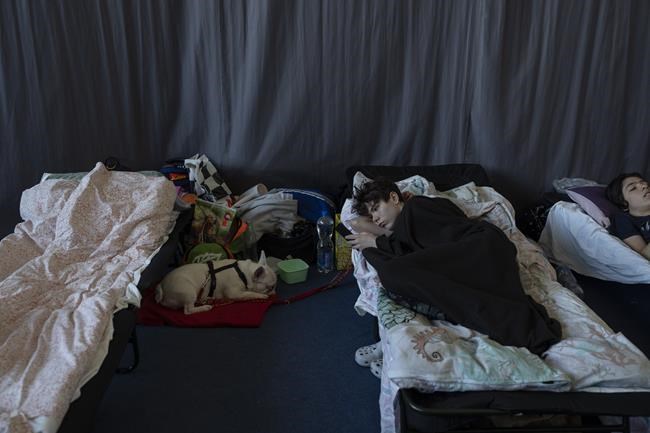Ukrainian refugees speak of bombs, half-empty cities, hunger
Advertisement
Read this article for free:
or
Already have an account? Log in here »
To continue reading, please subscribe:
Monthly Digital Subscription
$19 $0 for the first 4 weeks*
- Enjoy unlimited reading on winnipegfreepress.com
- Read the E-Edition, our digital replica newspaper
- Access News Break, our award-winning app
- Play interactive puzzles
*No charge for four weeks then billed as $19 plus GST every four weeks. Offer only available to new and qualified returning subscribers. Cancel any time.
Read unlimited articles for free today:
or
Already have an account? Log in here »
Hey there, time traveller!
This article was published 20/03/2022 (1013 days ago), so information in it may no longer be current.
MEDYKA, Poland (AP) — Yulia Bondarieva spent 10 days in a basement as Russian planes flew over and bombs were falling on the Ukrainian city of Kharkiv. Having reached safety in Poland, Bondarieva’s only wish now is for her twin sister in the besieged city of Mariupol to get out, too.
“They have been in the basement since Feb. 24, they have not been out at all,” Bondarieva said. “They are running out of food and water.”
Bondarieva, 24, managed to speak to her sister on the phone recently. The fear of what will happen to her in the encircled and bombed-out city that is going through some of the worst fighting in the war has been overwhelming.

“She does not know how to leave the city,” Bondarieva said after arriving in the Polish border town of Medyka.
Before the war, Mariupol had a population of about 430,000, and about a quarter got out shortly after Russia invaded Ukraine on Feb. 24. Leaving the besieged city later became nearly impossible. Tens of thousands escaped over the past week by way of a humanitarian corridor, including 3,000 on Monday, but other attempts have been thwarted by the fighting. The Mariupol City Council has asserted that several thousand residents were taken into Russia against their will.
Bondarieva said her sister told her of “Russian soldiers walking around the city” in Mariupol, and people not being allowed out.
“Civilians cannot leave,” she said. “They don’t give them anything.”
In a sign of the dangers for civilians trying to flee, Ukrainian President Volodymyr Zelenskyy said late Monday that Russian shelling along a humanitarian corridor had wounded four children who were among those being evacuated. He said the shelling took place in the Zaporizhzhia region, the initial destination of those fleeing Mariupol.
The battle for the strategic port on the Azov Sea raged on Monday, with Russian and Ukrainian soldiers fighting block-by-block. It’s not known how many have died so far in Mariupol. City officials on March 15 said at least 2,300 people had been killed, with some buried in mass graves. There has been no official estimate since then, but the number is feared to be much higher after six more days of bombardment.
Maria Fiodorova, a 77-year-old refugee from Mariupol who arrived Monday in Medyka, said 90% of the city has been destroyed. “There are no buildings there (in Mairupol) any more,” she said.

For Maryna Galla, just listening to birds singing as she arrived in Poland was blissful after the sound of shelling and death in Mariupol. Galla took a stroll in the park in Przemysl with her 13-year-old son, Danil. She hopes to reach Germany next.
“It’s finally getting better,” Galla said.
The United Nations says nearly 3.5 million people have left Ukraine since the start of the Russian invasion , the largest exodus of refugees in Europe since World War II.
Valentina Ketchena arrived by train at Przemsyl on Monday. She never thought that at the age of 70 she would be forced to leave her home in Kriviy Rig, and see the town in southern Ukraine almost deserted as people flee the Russian invasion for safety.
Kriviy Rig is now “half empty,” said Ketchena. She will stay now with friends in Poland, hoping to return home soon. “It (is a) very difficult time for everyone.”
Zoryana Maksimovich is from the western city of Lviv, near the Polish border. Though the city has seen less destruction than others, Maksimovich said her children are frightened and cried every night when they had to go to the basement for protection.
”I told my children that we are going to visit friends,” the 40-year-old said. “They don’t understand clearly what is going on but in a few days they are going to ask me about where their father is.”

Like most refugees, Maksimovich had to flee without her husband — men aged 18 to 60 are forbidden from leaving the country and have stayed to fight. “I don’t know how I will explain,” she said.
Once in Poland, refugees can apply for a local ID number that enables them to work and access health, social and other services. Irina Cherkas, 31, from the Poltava region, said she was afraid her children could be targeted in Russian attacks.
“For our children’s safety we decided to leave Ukraine,” she said. “When the war ends we will go back home immediately.”
Poland has taken in most of the Ukrainian refugees, more than 2 million so far. On Sunday evening, Ukrainian artists joined their Polish hosts in a charity event that raised more than $380,000.
The star of the evening was a 7-year-old Ukrainian girl, whose video singing a song from the movie “Frozen” in a Kyiv bomb shelter has gone viral and drawn international sympathy.
Wearing a white, embroidered folk dress, Amellia Anisovych, who escaped to Poland with her grandmother and brother, sang the Ukrainian anthem in a clear, sweet voice as thousands of people in the audience waved their cellphone lights in response.
____

Keyton reported from Przemsyl, Poland.
____
Follow the AP’s coverage of the war between Russia and Ukraine: http://apnews.com/hub/russia-ukraine


